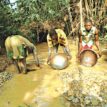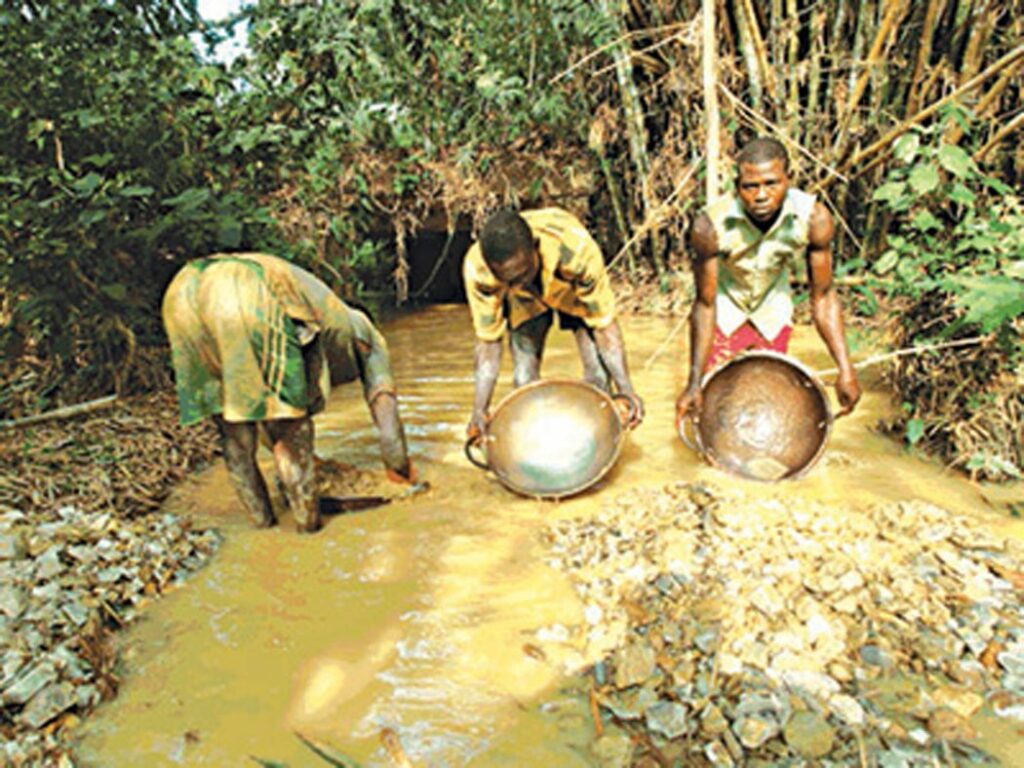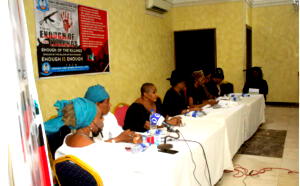By Gabriel Ewepu Nigeria’s mining sector was engulfed with the outbreak of lead poisoning in 2008 that drew global attention to rescue an...


By Gabriel Ewepu
Nigeria’s mining sector was engulfed with the outbreak of lead poisoning in 2008 that drew global attention to rescue and remedy the situation as over 600 children lost their lives, and it was traced to unsafe mining practices by illegal gold miners in Zamfara and Niger States.
The incidence brought pain to many families despite some children were lucky to survive the deadly pollution, but living with the devastating impact on their health for the rest of their lives despite being treated by an international, independent medical humanitarian organization, Medecins Sans Frontieres/ Doctors Without Borders (MSF), which has been in the forefront to stem the deadly scourge.
According to MSF, Association of Blood Lead Level with Neurological features was diagnosed in 972 children affected by acute severe lead poisoning outbreak in Zamfara State.
MSF also revealed that children presented with sudden onset of abdominal pain and/or vomiting, intractable seizures with or without fever, then sometimes rapid progression to death.
READ ALSO: NEF tells threatened Fulani communities in South to relocate to North
Symptoms were unresponsive to initial treatment by the MSF team for common endemic diseases such as malaria and meningitis, and anti-convulsants had little effect. “Over two months until 17 May 2010, nearly 300 children aged #5 years presented in four villages with these symptoms with a mortality of 48 per cent traceable to increase in small-scale ore processing with dry-milling to extract gold, which an outbreak of severe lead poisoning was confirmed.
MSF also in its report indicated that initially, seven rural villages were identified as extremely lead-contaminated due to dust dispersed by artisanal mining activities within the villages, with an estimated 3000 children aged #5 years at risk of lead poisoning.
“Identification activities included active case finding by MSF and investigations by State Ministry of Health with Nigeria Centre for Disease Control and US Centers for Disease Control and Prevention (CDC, USA), and environmental testing by TerraGraphics Environmental Engineering and CDC, USA.
“The true scale of contamination in the region remains unclear. Extensive environmental remediation has been undertaken. Health promotion has focused on removing the lead exposure harming children by relocating ore processing activities and minimising further lead contamination of the villages.
“A larger proportion of children with neurological features were aged 1–3 years compared with those without neurological features.
“The greatest proportion of high VBLLs were seen in children aged 1–,2 years, and the strongest association with neurological features was in this age group after adjusting for VBLL. During the initial outbreak investigation (before lead poisoning was confirmed and before chelation therapy began) proportionally more children aged 1–2 years died amongst children displaying probable or suspected neurological features.
“However, the neurological damage done by lead, beyond fatal lead encephalopathy, is long-term, and only continued monitoring will allow us to fully document and understand the long-term sequelae of lead toxicity in this cohort. Lead poisoning related to the industrial activity is an ongoing problem.”
With the current drive and promotion of Gold mining, processing, production, and export by the Federal Government, which players in the gold industry including artisanal miners to diversify the economy have been brought on board as catalysts, which licenses have been issued to gold refinery operators.
Also, the Central Bank of Nigeria, CBN, is set to off-take processed gold bars from miners at approved mineral buying centers with the aim of curbing smuggling of the commodity and illegal mining in the industry in order to save the capital flight and stop the illicit business.
Vanguard sort to know the level of preparedness and capacity building of gold miners in regards to safe mining practices to avoid a looming disaster that could be a recurrence of the sad tail still fresh in Zamfara and Niger States in the nation’s Gold industry as artisanal mining activities are increasing in the gold industry.
The President, Nigeria Chamber of Mines, NCM, Sani Shehu, warned that it is a time bomb that would cause a terrific setback to the gains government and investors are making if allowed to explode, hence urgent measures are to be put in place to avert the waiting disaster with a sustainable plan on safe-mining practices.
Shehu pointed that safe mining is a concept that is relatively new to miners in Nigeria but needs to be systematically applied in the gold mining industry and other areas of mining.
He said: “The concept of safe-mining is relatively new to artisanal miners because is a concept and is a knowledge-based kind of mining where you will now know the inherent danger that is associated with too much contact with these minerals.
“Some of these minerals are toxic and have some impurities that are not visible, and not until you are aware of the fact that there are things the eyes cannot see and can be harmful to you, you might not be able to take precautionary measures to guide against the danger.
“Like I said the starting point to putrefy the concept should be awareness creation and sensitization, and that has to be all-encompassing; the community leaders, artisanal miners’ leadership to know about, and in fact, there should be an aggressive campaign to sensitise people and educate them on the existence of this non-visible chemical that is harmful to the operators and environment.
“So, when that is done the second phase is to now package safety kind of programme that can protect artisanal miners from harmful invisible particles, and if that is done it will go a long way to reducing the negative impact of too much exposure to these minerals.
“Of course, there are some gadgets, technologies, and methods that are used in some other parts of the world to prevent the harmful effect of toxic elements. This is a concept that originated from the developed world and there are people who are committed to putrefy the concept, therefore most of them are willing to support with some resources to achieve this kind of objective.
“The Federal Government through the Ministry of Mines and Steel Development has bought into the concept including the Miners Association of Nigeria and the Nigeria Chamber of Mines, and we all are committed to the initiative.
“So the stakeholders including the development partners need to collaborate and come up with a road-map and strategy on how this concept can be actualized. The working together of stakeholders is very critical to the success of the initiative.
“This is the right time for the government to aggressively sensitive, build capacity and sustain the practice of safe mining as the government is promoting the development of the gold industry because not only gold but most of these minerals do not occur alone, there are associated minerals that are embedded in most of these minerals. Some of these associated minerals do not have a value yet. Some of them are toxic and harmful than others.”
Being a major stakeholder in the mining business, he also further stated that, “Gold, columbite, tin, industrial miners and others need to be educated on the existence of some harmful chemicals that are attached to the minerals and the need to adhere to safety measures.
“Whenever you have contact with any mineral, the miner needs to wash his hands immediately. In fact, there safety measures that need to be adopted by all miners. I am still saying the focus on safe mining should not only be on gold miners but for all categories of miners.”
He (Shehu) advised the government to go beyond the normal level of organizing workshops to set up a committee that will develop a sustainable plan.
“The approach to safe-mining practices and sensitization should not be just a workshop but should be done systematically.
“Workshop could be one of the components but form a committee and let them come up with a plan on how it should be done. It should be done in a sustainable way.
“Of course workshops are needed, train-the-trainer approach, courtesy visits to mining host communities’ leaders, mining associations and cooperatives to pass the information that later gets to the grassroots.
“I believe is a good concept and will go a long way to reducing the mortality rate among the mining community”, he added.
Also speaking with Vanguard Energy, the President, Miners Association of Nigeria, MAN, Kabir Kankara, called on the government to take the health of miners seriously as far as gold processing is concerned.
“The Gold project is coming up now which is becoming a ‘baby’ of the Federal Government, and it is a welcomed development, and for we miners is a window to showcase our mining activities to thrive and flourishing.
READ ALSO: Insecurity: Akeredolu raises alarm over illegal immigrants in Nigeria
“For the development of the gold industry health hazard is a critical issue most based on the past experience we had in Zamfara State, where we had lead poisoning and it is based on that we want to sit with the government and try as much as possible to explain to them that we cannot do business as usual as far as this issue is concerned.
“The Federal Government has to now put in some key measures to protect the health of miners in this sector. Firstly, the Ministry of Health, Ministry of Environment have to come in and look at how in doing it.
“Not only in lead poisoning, but even we are also talking about the use of mercury in gold processing and that has to be looked into. The United Nations Industrial Development Organisation, UNIDO, has come into the health sector to look at how it could help on all health hazards that have been militating against our miners generally.
Kankara warned that to avoid what happened in Zamfara, the government should collaborate with MSF, in order to protect the lives of the people and should ensure the lives of miners are guaranteed.
“Now it for government to identify what are the major health problems that are involved in this gold mining activity, and how it can be tackled and preserve the health of miners for smooth operations because there is no need to have gold when people are dying but it is when the people are alive then it becomes important to have gold beneficial to us.
“We need collaboration with Doctors Without Borders in order to empower and encourage them together with the Ministries of Health and Environment including other stakeholders because it will not speak well in the international community that Nigeria is still experiencing lead poisoning incidence.”
A source who wants to remain anonymous said called on the government to enforce the law in promoting safe mining which is not done to safeguard the mining sector, “If we are sincere and we need because the laws are all there and adequate. We need to enforce the law to regulate the sector.
“The law for safety mining environment is there and it is only to activate it ti we will have safe mining sites all over the country. If the law is being enforced nothing like lead poisoning can happen, and when the law is enforced none of the unethical and unprofessional deployment of mining methods, and that is the fact.
“My advice is for the law to be enforced to avert any disaster of lead poisoning. Activate the law and you will have good regulation of the mining sector.
“The law has been enacted and we believe that good laws will give dividends because the law is made to regulate man’s activities, and you don’t wait and do damage control but proactive to avoid damages”, he added.
The post Avert lead poisoning disaster waiting to explode in Nigeria’s gold industry appeared first on Vanguard News.

No comments